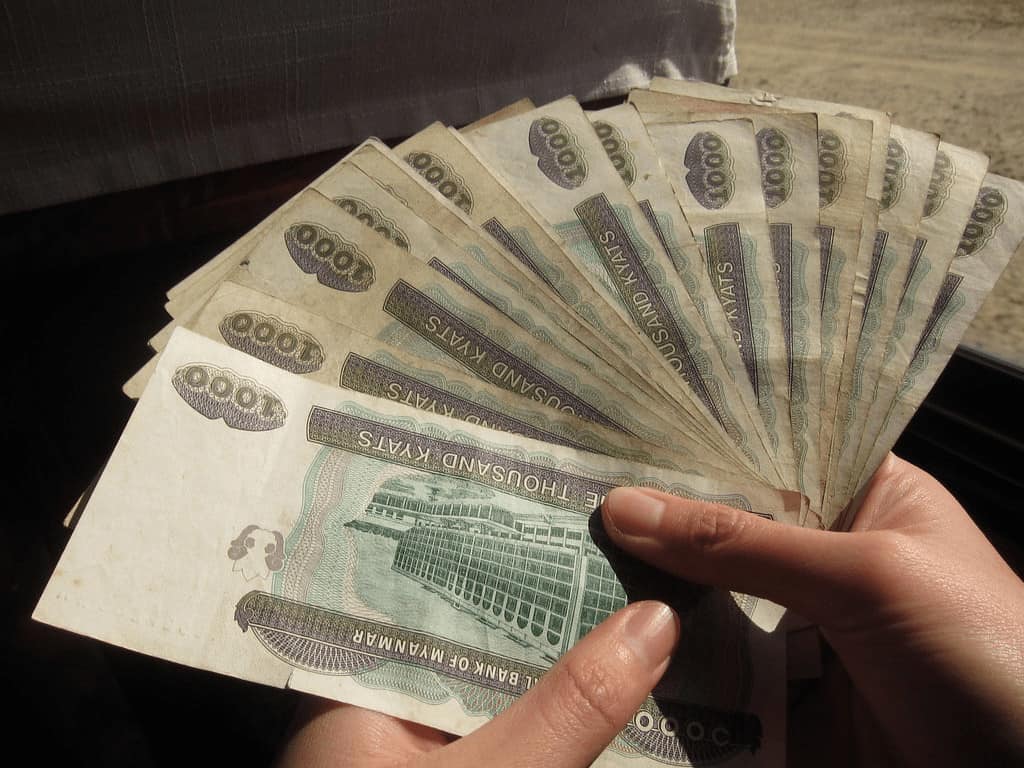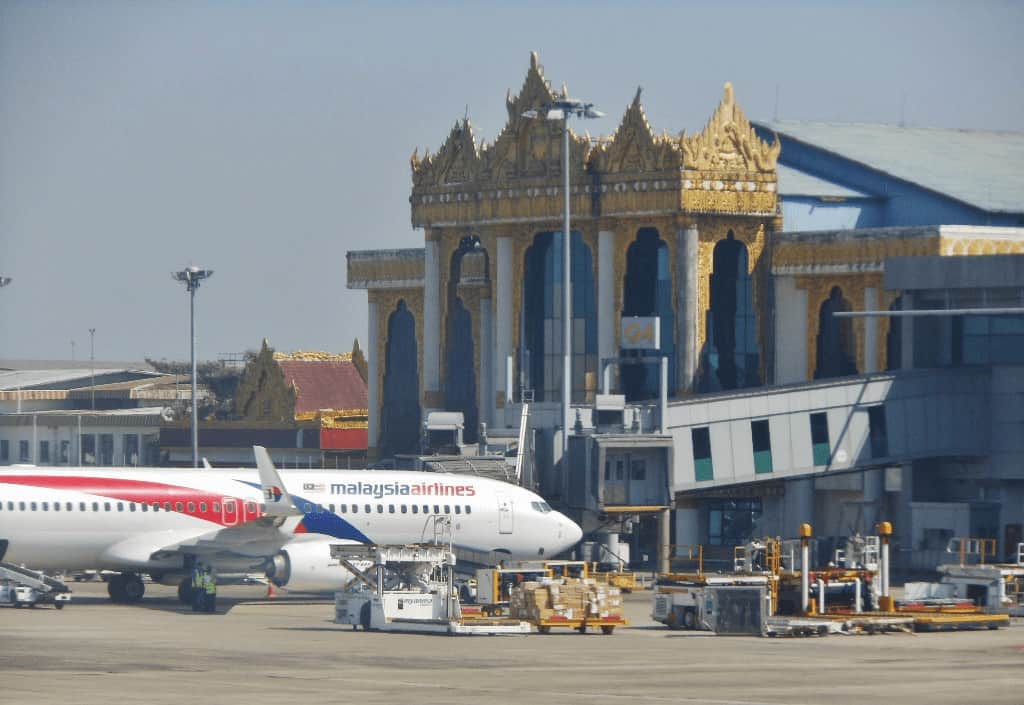A U.S. Embassy’s General Service Officer (GSO) has wide ranging responsibilities. Stanley Jakubowski, who was stationed in Burma (Myanmar) from 1990 to 1992, learned this first-hand. In one instance, he persuaded the State Department and the Department of the Treasury to recognize the unofficial exchange rate in Burma—roughly 100 kyat to the dollar, as opposed to the official rate of six kyat per dollar. This change lowered the cost of gasoline to only six cents a gallon and gave local staff a salary increase of 1,566 percent. The U.S. Treasury Department also considered the new rate a success because it facilitated its efforts to disperse reserves of 10 million kyat in only eighteen months, instead of the ten years it had initially predicted.
Jakubowski did more than simply write cables about the exchange rate. As GSO, his varied duties ranged from guarding the embassy’s currency window, shotgun in hand, to easing the passage of official Americans through the airport in Yangon, which he discovered could be sped up by distributing much coveted Victoria’s Secret catalogs to customs officials. His oral history describes the career of a management-coned officer in the Foreign Service.
Stanley Jakubowski holds a Bachelor’s degree in political science from Hofstra College, and a Master’s in government administration from the Harvard Kennedy School.
Jakubowski’s interview was conducted by Mark Tauber on October 2, 2017.
Read Stanley Jakubowski’s full oral history HERE.
Drafted by Seamus Gorman
Excerpts:
“I then wound up in a situation in which I had to stand with a shotgun at the exchange window to keep the American employees away.”
Money Problems: Every Monday the Budget and Fiscal officer and I would sit in consultation and decide what the exchange rate was going to be that week. One week I’d nudge it up a little bit and one week we nudge it down a little bit just to move it around a little bit. Then we started to have it set up at the currency window for people to exchange their dollars for kyat at about 100 to one.… So I then wound up in a situation in which I had to stand with a shotgun at the exchange window to keep the American employees away. I had to put a limit on how much they could buy in kyat because all of a sudden they all decided that even though last week they didn’t need any kyat this week they could use a million kyat. But it worked. It worked very nicely. My household, I had a housekeeper because my wife wasn’t there very often. She came in six days a week for 10 hours a day and it cost me $20 a month at the embassy exchange rate. Once, because my wife wasn’t around for some representational entertaining. I took about 20 people to a very nice restaurant in Rangoon for two or three hours. They ate what they wanted, drank what they wanted, had a wonderful time and it cost me 30 bucks U.S.
Q: Probably nowhere else in the world could you do that.
“When my wife found out about it, she was upset that I was handing pornography out to the Burmese.”
An Airport Scandal: We were having trouble at the airport. The Americans coming in, the expeditor was having trouble getting them through passport control and getting the baggage and everything else. Which was not the way it was supposed to work, but the local military down at the airport was giving him trouble. So in trying to figure out what to do I decided, I went to the defense attaché’s office and I asked him for copies of old magazines that they get, you know, Army Military Weekly or the Air Force Journal, all of these kinds of things that were just laying around. I said, give me anything you’ve got that you’re willing to get rid of. And then I went to the mail-room and I talked to the mail clerk. I said, the Victoria’s Secret catalogs, everybody who isn’t here, who gets a Victoria, I want all the Victoria’s Secret catalogs, and I got a stack of Victoria’s Secret catalogs. And then I told the expediter, went to the airport. If it was an officer, he got the Army Journal, Air Force Weekly, whatever. If it was, an NCO he got a Victoria’s Secret. We had no more trouble at the airport. The expeditor could go, pick up your passport and your baggage ticket. You will leave. No sweat. Don’t even stop. And everything flowed smoothly. When my wife found out about it, she was upset that I was handing pornography out to the Burmese. Victoria’s Secret catalogs. I said, okay, but it works, it works. We had no more hassles at the airport; get that over and done with.
“Well, we paid for our gasoline in kyat supplied by the state gasoline company. It worked out to six cents a gallon.”
No More Kyat: Well, we paid for our gasoline in kyat supplied by the state gasoline company. It worked out to six cents a gallon. It was wonderland. It was really, it was really wonderland…. This little lovely thing went on for about 18 months.
About two months before I’m ready to leave, I walk in one Monday morning and there’s a cable from State saying close the window. We’ve decided that you can’t use the unofficial exchange rate anymore. It turned out we had used the 10 million kyat that Treasury had. They didn’t have any more kyat. So they closed the window. When the DCM, Pancho Huddle, Franklin Huddle who was the DCM, he got the news, he was upset, he was distraught. Because not only had the window been closed, but he thought there was some criticism in the whole thing. And I said, no, no, no, let’s go in and ask for our award. And, and he looked at me and said, well, there was 10 million kyat and our original projection 18 months ago was that it would last for about 10 years.
And, and we’ve managed to do in 18 months what we thought was going to take 10 years to do. We should get an award.
TABLE OF CONTENTS HIGHLIGHTS
Education
BA in Political Science, Hofstra College 1970-1973
MA in Government Administration, Harvard Kennedy School 1982-1970
Joined the Foreign Service 1974
Bamako, Mali—Joint Administrative Operations Director 1983–1987
Yangon, Burma—General Service Officer 1990–1992
New York, New York—Deputy Management Officer at USUN 1992–1994
Singapore, Singapore—Admin Counselor 1994–1995



